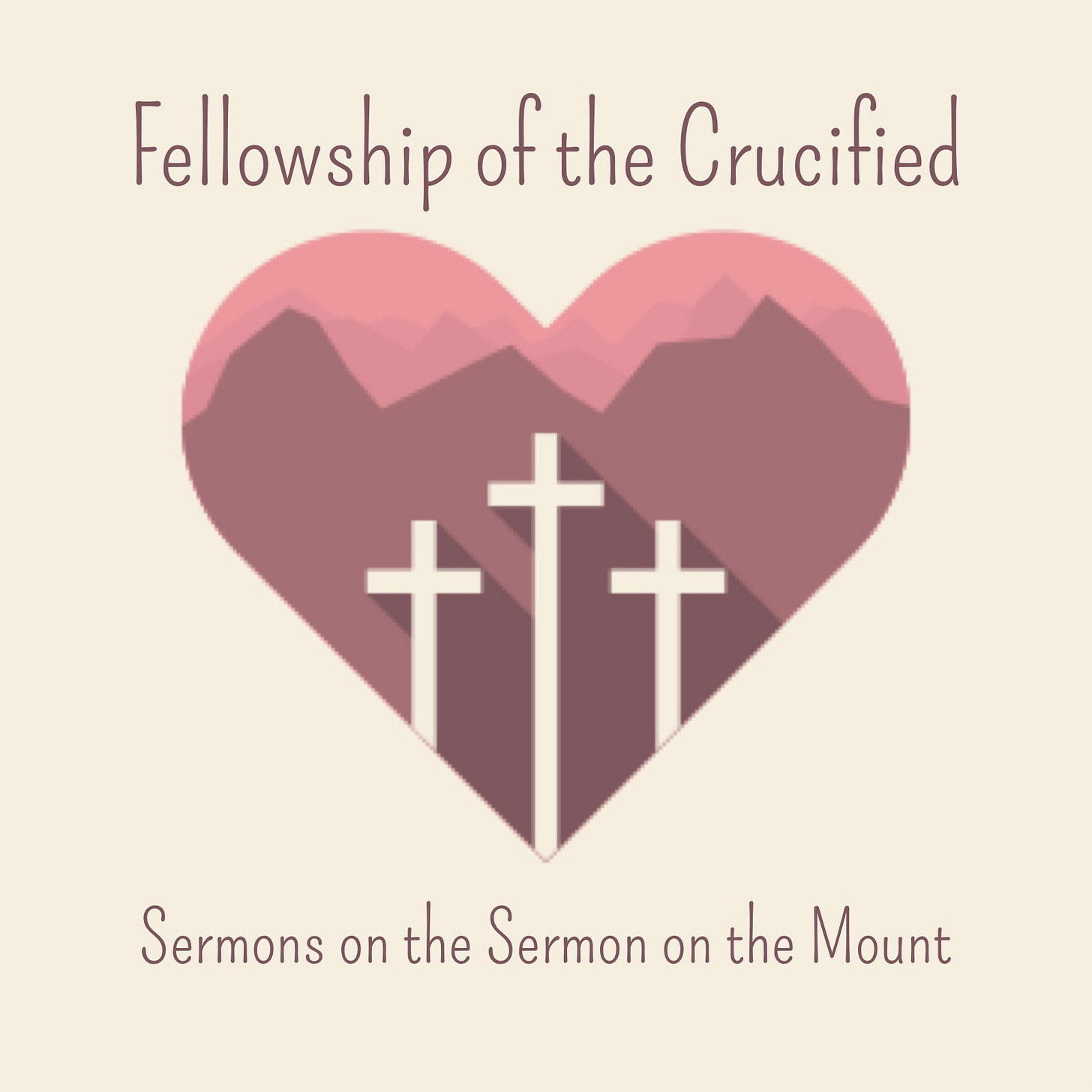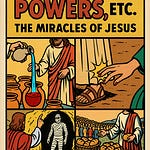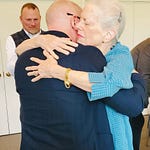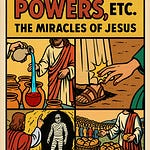Matthew 5.1-3
When I first met her, I asked her point blank (I am an Enneagram 8, after all, why waste time dickering), “So who the hell are you? What’s your story?” Kara chuckled and replied, “Who am I? Well, I think the best and most determinative answer is that I am a sinner saved by the grace of God in Jesus Christ. Everything else about my life flows from there.” Kara is the canon theologian for the Episcopal Diocese of New Jersey, a priest at Trinity Episcopal Church, and a faculty member at Princeton. Her first PhD, however, is in mechanical engineering from Duke University with a speciality in non-linear dynamics; that is, how complicated systems under stress behave. Her expertise in non-linear dynamics led her into aerospace science— satellites, drones, and rockets.
When she graduated from Duke the first time, the federal government recruited her to work at the NASA research facility in Hampton, Virginia. She started working at NASA’s rocket laboratory in January 2001. Nine months later planes took off from the same facility, flying past her office window. The chain of command had dispatched them to shoot down Flight 93 somewhere over western Pennsylvania before it reached Washington DC. In the days after September 11, 2001, Kara began to intuit that the nature of her work would quickly change. Space exploration, she rightly judged, would no longer be the government’s priority for her research (if it ever truly was in the first place). America would need drones, rockets, and satellites in other places and for a much different purpose.
Kara shared with me how she struggled, knowing that, as a follower of Christ, and her expertise would soon serve ends she had heretofore failed to countenance:
“I grew up in the Church. But in the years after 9/11– with the invasion of Afghanistan, the occupation of Iraq, and the surveillance of Americans— I started wrestling for the first time with the question, What does it mean to be a follower of Jesus? To put a finer point on it, What does it mean to be a follower of Jesus who is doing this particular work? I’m a sinner saved by the grace of Jesus Christ, of course, but also— more so— the Jesus whose grace saves me is the same Jesus who brought the Kingdom of God near to us in time. Over and over again, I would be at work and I would find myself asking myself, “Is this really okay? Should I be doing this?” I endured in that way for over five years. But the work I was doing kept bumping up against the faith I was professing. I discovered that the disconnect had made my life personally destructive, and I feared it had also made my faith unintelligible. How could I claim in any meaningful way that I worshipped the Prince of Peace if I knew my work led directly to civilian casualties?”
As a result of the stress, her personal life fell apart.
She left NASA.
“I lost a lot,” Kara told me, “but the balancing act proved unsustainable. I couldn’t keep serving two different kingdoms. If Jesus has brought the Kingdom then I need to live at home in it.”
Now compare Kara Slade to Pastor Sean Moon, founder of the Unification Church and Rod of Iron Ministries. The estimated three million members of Rod of Iron Ministries believe the AR-15 is the Rod of Iron mentioned in the Book of Revelation, and the Church uses the rifle in their liturgical ceremonies. They’ve also put the AR-15 on their church flag and Pastor Moon keeps a gold-plated AR-15 on his desk. “The Lord is a warrior,” he explains, “ and in Revelation 19 it says when he comes back, he’s coming back as what? A warrior. A mighty warrior leading a mighty army, riding a white horse with a blood-stained white robe … I believe that blood on that robe is the blood of his enemies because he’s coming back as a warrior carrying a sword.” He added to this claim that the sword of which Revelation speaks is not a literal sword but the AR-15, and that the Second Amendment as a teaching that came from Jesus.
Pastor Sean Moon is especially fond of the Florida’s gunmaker, Spike’s Tactical, who makes an AR-15-style rifle called the “Crusader.” Spike’s Tactical chose the name intentionally, carefully, explaining on their website: “Spike’s Tactical created a balanced reliable rifle that would bring an excellent fighting rifle to people of all abilities and resources. The every man fighting rifle. We named it Crusader and engraved Psalm 144:1 on the lower receiver to hoist the flag of our faith and to make a statement, reminding our customers that we are with you. The war is here. We have a Christian duty to defend our homeland and our way of life with force. The rifle features an engraved Templar shield logo opposite the psalm, and has three settings on it (safety, single fire and semi-auto) but named, “Pax, Bellum, & Deus Vult,” or “Peace, War, and God Wills It.
Peace, War, God Wills It— that was the battle cry of the First Crusade.
The distinction between Kara Slade’s story and Sean Moon’s “ministry” is more than a contrast in politics. It is a difference over how to interpret Christ’s Sermon on the Mount. More determinatively, it is disagreement about time. Kara Slade and Sean Moon exemplify two divergent ways of conceiving the time in which we live as followers of Jesus Christ. It’s a question of what time is it.
Either we live in the time after the time when Christ our Lord has brought the Kingdom of God near in himself and therefore the Kingdom determines how we, as disciples, live our present lives.
Or, we live still in a time of advent in which the cross of Christ was not the turning of the ages and therefore the Kingdom of God can be nothing more than a hopeful, burdensome ideal in the present or a possibility for the eschatological future but regardless it has no authoritative bearing upon our present lives.
It’s a difference in telling time.
It’s a question of the time in which followers of Jesus live.
If you think I’m in danger of making the first beatitude, which sounds rather simple and straightforward, needlessly philosophical, then I invite you to turn to the passage which immediately precedes the Beatitudes and thus provides the interpretative key for the entire Sermon on the Mount. The very reason Jesus has attracted crowds who have followed him up the Mount of Beatitudes is that, having been tempted in the wilderness for forty days, Jesus inaugurated his ministry by making the audacious claim, “The Kingdom of God has come near.” Note too, for example, how Christ conjugates the first beatitude not in the future tense but the present, “Blessed are the poor in spirit, for theirs is the Kingdom of God.”
Is not will be.
Christ can announce the Kingdom belongs to the poor in spirit because the Kingdom has already come. In him. He has brought the Kingdom in himself for in Christ the One who announces the Kingdom and the Kingdom itself are one; such that, to be in Christ is now to belong to his Kingdom. Unless we understand what time it is according to Christ— that is, unless we know the Kingdom has already been brought near by Jesus— then we are bereft of the resources to understand, much less live, the Sermon on the Mount— which, by the way, are the same thing. That the announcement of the Kingdom precedes the Sermon on the Mount means that the Sermon on the Mount presupposes the existence of a community committed to living as though we are already at home in the Kingdom of God.
In other words, the Sermon on the Mount is not a prescription. It’s not, Become a peacemaker and you will inherit the Kingdom. It’s not Law; it’s description. It is the characterization of the community called out from the world and gathered around Jesus. This is why, for example, Matthew makes a point in verse one to distinguish between the crowds, whose curiosity about Jesus has led them up the mountain, and the disciples, whose commitment to follow have led them to venture further up the mountain to Jesus.
But I can’t do what Kara Slade did, you may be thinking— just as you may be thinking that Sean Moon is perhaps an exaggerated example of a way in the world that nonetheless makes sense given the way of the world. Again, the Sermon on the Mount is a description not of an individual disciple but of a community committed to living the Kingdom that has come near in Christ.
The Sermon on the Mount is not simply directed to a community of disciples; it requires a community of disciples.
As Stanley Hauerwas writes, “To live in the manner described by the Sermon on the Mount requires learning to trust in others to help me so live.” Jesus has just announced the nearness of the Kingdom and called the twelve to it. He’s gathering a distinct, particular community from the world. The aim of the Sermon on the Mount is to create dependence among us. It’s purpose is to force us to need one another. I can’t do what Kara Slade did, but maybe you can and, together, we can equip one another to bear witness to the Kingdom Christ has already brought near. Discipleship then is not about the goals it seeks to reach but the Lord it seeks to reflect.
This means the Sermon on the Mount cannot be read rightly by those not formed into a community of discipleship. No matter how much alleged sense the golden rule might make to an unbeliever, Christ’s teaching that we should love our neighbor as ourselves is nevertheless unintelligible apart from the conviction that in Christ God became our neighbor and loved us while we were yet his enemies. Or take the first beatitude.
An unbeliever may assume they can guess what Jesus might mean by a person who is poor in spirit.
Only a believer, however, will know that the Sermon on the Mount is first of all the self-interpretation of Jesus.
Poor in spirit is an attribute that distinguishes him, “who, though he was in the form of God, did not regard equality with God as something to be exploited, but emptied himself, taking the form of a servant.” You must first be a member of a community of discipleship before you can know that to be poor in spirit is to look upon the world and weep— weep like Jesus before Jerusalem; weep “for they do not know the things that make for peace.”
What’s true of any sermon is all the more the case with Christ’s sermon. The sermon cannot be isolated from the congregation to which it’s preached. The Sermon on the Mount requires a community of mutual dependence. This is the reason the Sermon on the Mount often functioned as a catechism in the ancient Church for converts to the Gospel. If you are to interpret the Sermon on the Mount properly, you must already be a member of a people shaped by habits that those who do not follow Jesus cannot be expected to possess.
One late summer Sunday in my first church—
The assigned scripture that Sunday was Matthew 18, the passage where Peter asks Jesus, “Lord, how many times shall I forgive my brother when he sins against me? Up to seven times?" And Jesus answers, "I tell you, not seven times, but seventy-seven times.””
After the worship service, the postlude was still playing on the organ and I was standing outside on the church steps ready to greet folks. A woman about my mother’s age at the time marched out of the sanctuary with three kids in tow and elbowed her way in front of an old man with a walker. With absolute fury in her eyes and loud enough for everyone in line to hear she said: “Do you mean to tell me I need to forgive my ex-husband for cheating on me and then walking out on me and the kids?”
You all know me by now. You know how good I am in these situations. So when she hit me with her question, I replied eloquently, “Uh....”
And I qualified and equivocated: “Well...um...Jesus was just talking to Peter not all of the disciples and...Jesus doesn’t say that in every single Gospel...and— you know how preachers are— often Jesus speaks in hyperbole to get his point across...I’m sure Jesus understands how you must feel...”
But she just kept staring at me.
And I stammered some more. Until finally I surrendered and said, “Um, uh, well, I suppose, yes, I think Jesus would... probably... tell you to forgive him...I guess.” I expected her to storm off, seething, and maybe send me an email the next morning reiterating all the ways I was an idiot. But she didn’t. She just looked me square in the eye and said, “Good. That sounds like it will take me somewhere other than the place I’m in right now.”
I smiled, relieved. I wiped the flop sweat from my forehead and waited for her to move on her way, but she kept standing there, peering at me.
“Can I help you?”
“How?”
“How what?”
“How am I supposed to forgive him?”
“I don’t have a damn clue,” I said. But then I looked down the sanctuary aisle at an old, gruff woman named Dot, a survivor of domestic abuse.
“I don’t have a damn clue, but there’s someone here who knows the way.”
Just as a sermon cannot be abstracted from the congregation so too the sermon cannot be separated from the one who preaches it. When we approach the Sermon on the Mount with supposedly realist assumptions, asking questions like “Do I really have to give to everyone who begs of me?” or “Does he mean turn the other cheek, literally?” we obscure the fact that the preacher of the sermon is Jesus. The identity of the proclaimer makes all the difference for how we hear the Sermon. In this case, the preacher of the Sermon on the Mount is the proclaimer of the Kingdom. And Jesus is not only the proclaimer of the Kingdom, he is the advent of that Kingdom and we must hear his Sermon according to the new time— the time of the Kingdom— he has inaugurated.
In his twelve page footnote on the Sermon on the Mount, the theologian Karl Barth analogizes our time in the Kingdom to “an offered checkmate” in a game of chess wherein one player has all but one won but the other player may wonder for another moment or two if there is not the possibility of avoiding the other’s victory. Barth writes:
“The reign of the Kingdom of God seems not yet to have come, or merely to have drawn near, or merely to beckon…as a future possibility. The Sermon on the Mount reckons with this powerful and fatal appearance by saying of those who are poor in spirit that theirs is the Kingdom now….because they hope for it, they already have it; because they know that it has come, they are already called to live as citizens within it. The chess game is actually already There are only one or two moves left and the outcome is determined in God’s gracious covenant love. The Beatitudes witness to this reality, and summon us to celebrate it by living into the reign of God.”
If Jesus is the promised Christ, if he has brought the future Kingdom near, if his cross is the turning of the ages, then to hear the Sermon on the Mount as a naive or idealistic ethic is think according to the old age of sin and death, an age that, on account of Christ is already passing away. If the Gospel is true, then Christ has made it possible through his death and resurrection for us to live in accordance with the way of life described by the Sermon, for the Son has demonstrated for us a way of faithfulness that trusts in nothing less than the Father’s vindicating love.
After all, it’s less obvious to us today perhaps, but when Matthew’s initial audience first heard Matthew’s Gospel their immediate reaction would have been to recognize that the preacher of the Sermon on the Mount had, incontrovertibly, suffered and died while living in exactly the manner envisaged by the Sermon. Precisely because Christ is risen we can know that the preacher of the Sermon on the Mount is not one who extols a way of life never tested or tried. The crucified Christ is risen indeed; therefore, we know as unmistakably as an empty grave that the new age has begun and that we can, by depending upon one another, live at home in it.
If Christ is risen, the way of life described by the Sermon on the Mount— the Kingdom of God— is not an impossible ideal.
It’s reality.
It’s the realest reality in the world.
And what we take to be “the real world,” the world of sin and poverty, violence and greed, is, in fact, the unreal world destined to pass away because in Christ it already has passed away. In Christ, the real world of the Kingdom already belongs to the poor and the meek and the peacemakers.
I know talk about time and the turning of the ages can sound abstract, but just Thursday night I was watching the January 6 hearings on my tablet. Once again, I was struck by the ubiquity of the Christian flag in the video footage Liz Cheney showed of the mob at the insurrection.
The world desperately needs more disciples willing to venture beyond the crowd, a people who know what time it is. The Church needs more followers who believe the Kingdom has been brought near and who attempt to live at home in it.
Sixteen years ago, in a small Amish community in Georgetown, Pennsylvania, twelve-year-old Emmanuel King left his home around 5:30, as he did most mornings, to help a neighboring Amish family milk their cows. He rode his scooter out his family’s mile-long farm lane and turned right onto Georgetown Road. As he rounded a slight turn, an oncoming pickup truck crossed the center line, struck little Emmanuel and threw him to the far side of the road. The truck hit a fence post and sped away.
The next day, a reporter covering the hit-and-run accident went to Emmanuel’s home, but what the reporter found was not what he had expected— a gracious spirit toward the woman whom police considered and later confirmed to be the hit-and-run suspect. Emmanuel’s mother was grief-stricken but nevertheless wanted to convey a message to the woman. “She should come here. We would like to see her,” she told the reporter. “We hold nothing against her. We would like to tell her we forgive her.”
When the driver read the newspaper headline, “A Boy’s Death, a Family’s Forgiveness,” she did a surprising thing. She went to the King family home to receive their words of forgiveness. She returned again for Emmanuel’s viewing and again for his funeral. Over the next several weeks she came back three more times and, later, she bought a new scooter for the children on what would have been Emmanuel’s thirteenth birthday.
When a reporter asked a family member why they would forgive the woman who killed their son and left him dead in the ditch, the reporter was told, “Because that’s just the way the real world works.”













